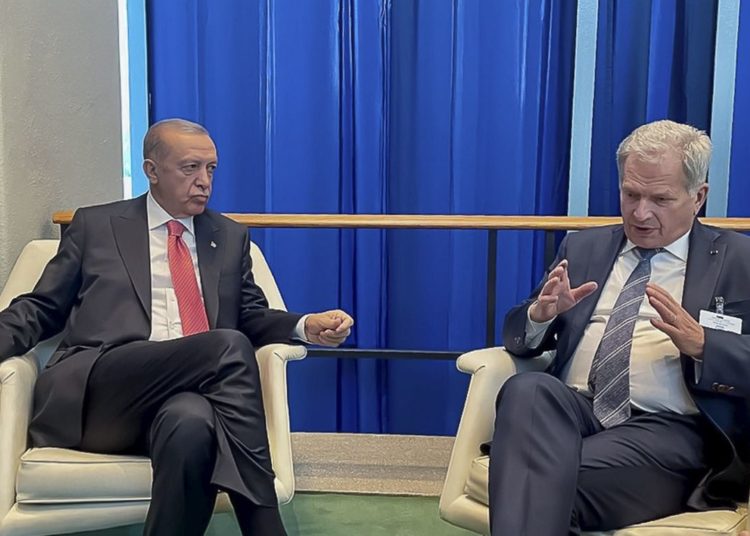Levent Kenez/Stockholm
An intelligence document obtained by Nordic Monitor shows that the Turkish Embassy in Helsinki profiled and gathered intelligence about persons believed to be affiliated with the Gülen/Hizmet movement, a group critical of Turkish President Recep Tayyip Erdoğan, to help forge new extradition cases while Turkey and Finland continue negotiations for the latter’s NATO membership.
The leaked information note dated July 19, 2022 was prepared by the interior ministry counselor at the Turkish Embassy, a new position for Turkish diplomatic missions whose personnel are from the Interior Ministry. The position was designed to carry out coordinated work with the Turkish police and judiciary in 2017 after it was revealed that Turkish diplomats were spying on Erdoğan’s opponents in 2016, a clear violation of the Vienna Convention on Diplomatic Relations and Consular Affairs. Nordic Monitor previously reported that senior ambassadors repeatedly expressed their discomfort at the annual Turkish ambassadors meetings, claiming that intelligence-related duties put them in a difficult situation in the countries where they serve.
The first part of the profiling document includes five persons for whom extradition requests were previously rejected as well as the reasons given by the Finnish authorities.
Intelligence document sent by the interior ministry counselor at the Turkish Embassy in Helsinki details spying activity in Finland.(The names and addresses of the Turkish nationals have been redacted for security reasons):
According to the counselor’s note, Finnish authorities declined one of Turkey’s requests since the person was determined not to be in Finland. For two suspects, the alleged crime does not constitute a crime under Finnish law, and for two persons it is unclear whether the alleged crimes constitute a crime in Finland or not. Turkey withdrew one extradition request since the charges against that person were dropped in the Turkish courts.
An interesting detail in the document is that Finnish authorities do not consider it a crime to deposit money in the Gülen-affiliated Bank Asya or to download a messaging application called ByLock.
The Turkish government accepted such activities as having an account at Bank Asya, holding an administrative position at a Gülen movement-linked institution, subscribing to the group’s publications, being a member of a trade union or other institution with ties to the Gülen movement and using the encrypted messaging application ByLock as benchmarks for identifying and arresting tens of thousands of followers of the Gülen movement on charges of membership in a terrorist organization.
On November 15 the United Nations Human Rights Committee, in a decision on a Gülen-affiliated defendant’s application, announced that “as a matter of principle, the mere use or download of a means of encrypted communication or bank account cannot indicate, in itself, evidence of membership of an illegal armed organization, unless supported by other evidence, such as conversation records.”
The second part of the document includes the addresses and ID numbers of 28 Turkish citizens as well as the names of the associations allegedly affiliated with the Gülen movement to which they have contributed. Some of the people who were profiled are only mentioned to have attended an Iftar dinner at a Gülen-linked association. For one person, it is stated that his/her son participated in a sports competition in Finland. The document notes there is a strong possibility that there are arrest warrants for these people without any information about what kind of crime they may have committed.

The counselor asks the Interior Ministry to advise the relevant authorities to initiate extradition proceedings if deemed proper.
On June 28 Turkey, Finland, and Sweden during a NATO summit in Madrid signed a memorandum to address Turkey’s concerns, paving the way for Finland and Sweden’s NATO membership, which Turkey had previously announced it was against.
Apparently, Turkey wanted to strengthen its hand by increasing the number of people requested to be extradited during the negotiations with Finland given the date of the document.
The counselor notes that intelligence is gathered from open sources, press scans and a review of Gülen-affiliated NGOs’ activities. The fact that the address information of many people has not been provided as well as the abundance of information that is not based on reliable sources shows that the document was prepared quickly upon a last-minute request.
The profiling document was conveyed to Ankara by Gendarmerie Colonel Murat Kerçek, the current interior ministry counselor at the embassy. Kerçek previously served as head of software development at the Gendarmerie Command.
In May 2021 Nordic Monitor published profiling documents of 31 Turkish nationals in Finland who were listed in espionage files dispatched by Turkish diplomats in Helsinki. They were charged with “membership in a terrorist group” by prosecutor Adem Akıncı. The investigation was based on intelligence files created between 2016 and 2018.












